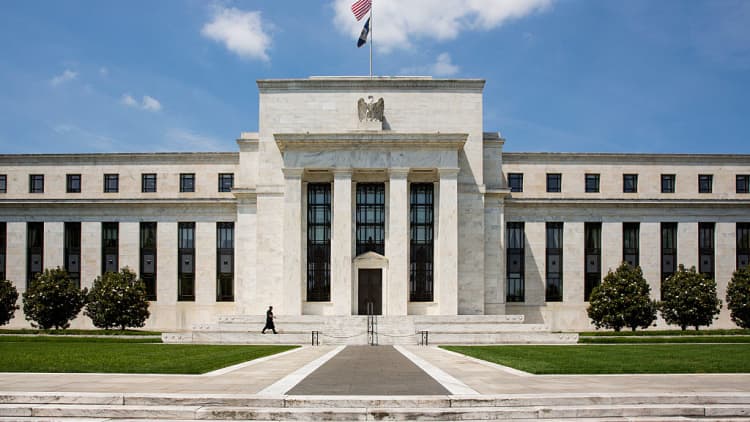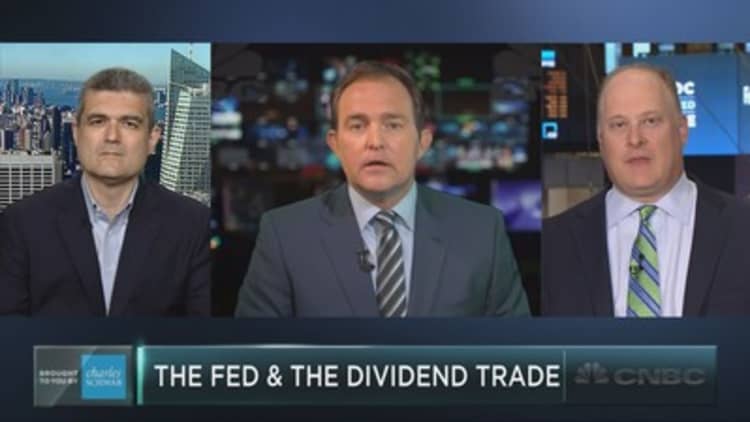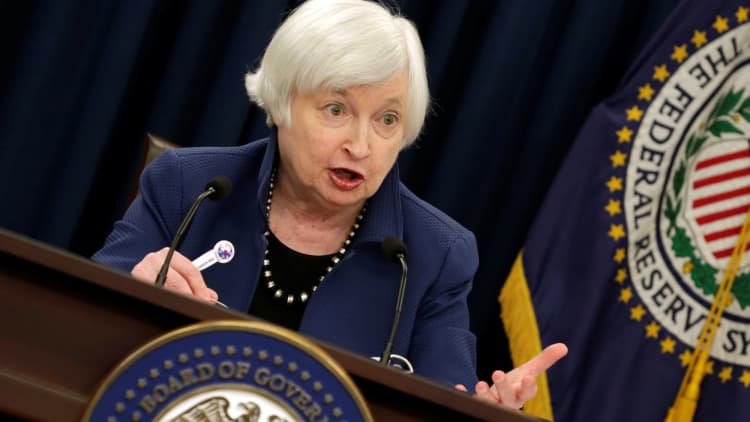
Sluggish inflation has made the Federal Reserve's efforts to get interest rates back to normal levels a lot harder.
The Fed is expected to raise interest rates Wednesday by a quarter point, and it has forecast another rate hike for this year. But the recent slowdown in inflation has become a red flag for markets, which doubt the Fed's ability to hike a second time before year end.
The Federal Open Market Committee is expected to raise the fed funds target rate to 1 to 1.25 percent.
Fed Chair Janet Yellen holds a post-meeting briefing and is expected to provide some more detail on the Fed's $4.5 trillion balance sheet. The Fed hopes to begin shrinking that balance sheet this year by scaling back a program to replace Treasury and mortgage securities as they mature.
Inflation will already be top of mind for markets Wednesday, even before the Fed's 2 p.m. statement. The consumer price index is released at 8:30 a.m. ET, as is the latest retail sales report. That CPI report is expected to show that May core inflation was running at an annual rate of 1.9 percent, the same as April. CPI fell below 2 percent in April for the first time since late 2015.
The Fed's preferred inflation measure, the PCE deflator, also came in at a weaker 1.5 percent, well below the Fed's 2 percent inflation target.
"I don't think inflation coming off is going to alter the current upward trajectory for rates right now," said Chris Rupkey, chief financial economist at MUFG Union Bank. "I don't think we're going to take one or two rate hikes off the table for the next one or two years. I think they're going to stick with the game plan.
"It's still premature to say they need to alter their policy," Rupkey said. "The basic textbook theory is that unemployment is lower than where it should be normally, and in these circumstances, inflation can gain a foothold if they don't normalize rates. It's really theory trumping the actual economic data. I know they say they're data dependent. I don't think they're data dependent on inflation."
Rupkey said the markets will be watching both the inflation and retail sales data. Retail sales are expected to rise 0.1 percent, below the 0.4 percent last month.
"There was a soft patch for the consumer in the first quarter. It looked like retail sales were stronger a month ago," Rupkey said. "What if there's a new setback on consumer outlays? It could affect the market's thinking. The market could say: 'Sure, you have three rate hikes this year and for next year, but we don't see it now because the economy's not emerging from its slump."
Bob Doll, chief equity strategist at Nuveen Asset Management, said he expects a rate hike Wednesday, but he, like the market, sees about a 50 percent chance of another hike.
"I think that's going to be the most interesting part of the conversation," said Doll. "With economic growth not as robust as it might have been three months ago and inflation not rising like it was three months ago, there's a lot of great questions they have to answer: 'You're really going to do it again this year?'

"I think it's 50-50," he said. "Maybe there will be more clarity one way or the other that helps us move that 50 percent."
The markets will also be watching for inflation in both the Fed's comments and in its forecast. The Fed currently forecasts PCE inflation will be at 1.9 percent this year, and Deutsche Bank's chief U.S. economist Joseph LaVorgna said that could come down by a tenth of a percent. The Fed forecasts 2 percent for 2018 and 2019, which he expects to remain unchanged.
"I think they got people very interested in the inflation data because they talked about it in the minutes [of the last meeting]," LaVorgna said. "The potential for some real newsworthy stuff is there, not just in the statement but obviously the press conference and any tweak they make to the forecast."
Core CPI inflation has increased at a 0.6 percent annualized rate over the last three months, the slowest pace since May 2010. Unemployment is at a low 4.3 percent.
The Fed's dual mandates are inflation and employment, and LaVorgna said the low unemployment rate will now trump the inflation data, because it is lagging. He expects CPI to drift back to 2.1 percent by the end of the year.
Economists expect the Fed to say that the low inflation is transitory, but that's yet to be seen.
One factor that drove down inflation was the repricing of cell-phone data plans, which created a decline in inflation when prices dropped for consumers. Wireless telephone services declined 32.4 percent annualized over the past three months, and are down 12.9 percent annualized compared to a year ago, according to LaVorgna.
He said he expects the weak cell-phone plan prices to be transitory but inflation could be impacted by housing rents. The rental vacancy rate is seen as a leading indicator for housing rents, and it has begun to rise, reaching 7 percent in the first quarter. Shelter rent has risen just 2.7 percent annualized over the past three months, well below the six-month growth rate of 3.1 percent.
"We're at a lower core inflation rate than prior to when the Fed started hiking rates," said Jim Caron, fixed-income portfolio manager at Morgan Stanley Investment Management. "The core numbers aren't looking so good. I think that's an issue. I would also say June is the inflection point. June is really where we would expect inflation to bottom."
Caron said it makes the Fed's job harder. "They've got to address the issue of why they are hiking rates when they're so far below your inflation target," he said.
Watch: Markets want Fed to answer $4.5 trillion question



